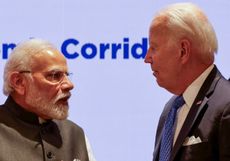The appeal of Argentina's radical libertarian Javier Milei
Chainsaw-wielding Trump admirer and 'tantric sex coach' elected president thanks to beleaguered economy

A self-avowed "tantric sex coach" and chainsaw-wielding far-right libertarian might seem an unlikely attraction for a country grappling with serious financial woes.
But Javier Milei, a former economics professor and daytime TV star, has been elected president of Argentina, "catapulting South America's second-largest economy into an unpredictable and potentially turbulent future", said The Guardian. The "volatile" Milei, 53, secured 56% of the vote, with 44% going to his opponent Sergio Massa, the economy minister in Argentina's centre-left Peronist government. It was a result that shocked the political establishment.
Argentina's "sharp swing to the right" comes amid an economic crisis, said Politico, with inflation "soaring" to 143% and two-fifths of the nation "living in poverty". Milei, a "self-described anarcho-capitalist" and admirer of Donald Trump, campaigned on "radical changes" like swapping the Argentine peso for the US dollar, shutting the central bank and "gutting public spending".
Subscribe to The Week
Escape your echo chamber. Get the facts behind the news, plus analysis from multiple perspectives.

Sign up for The Week's Free Newsletters
From our morning news briefing to a weekly Good News Newsletter, get the best of The Week delivered directly to your inbox.
From our morning news briefing to a weekly Good News Newsletter, get the best of The Week delivered directly to your inbox.
"Today the reconstruction of Argentina begins," Milei told supporters at his campaign headquarters in Buenos Aires, calling his victory a "miracle".
'An academic, not a politician'
Milei's popularity with voters is partially down to his use of social media, said the Buenos Aires Times. There are "hundreds of accounts online that support him", including one – "Juego de Milei" (Milei's game) – that includes a link to a mobile game through which users can play as Milei and "fight against leftists, the political caste and the central bank".
Milei's online campaign used a form of "horizontal communication", according to the journalist and data analyst Diego Corbalán, in which the candidate himself is not in control of the flow of information, but many social media accounts endorsed by him disseminate his message. The message is conveyed through what Corbalán calls "a natural movement of the young people" on social media that are sharing content, as opposed to the more traditional "vertical" campaigns that are based on information coming from the candidates.
Indeed, one key factor has been "the devoted following he has whipped up among young, largely male voters", said Al Jazeera: some are "devoted libertarians"; others "merely curious" and "disaffected" with the political establishment. Milei has "consistently led polls of voters between the ages of 16 and 35", unlike other right-wing populists like Trump and Brazil's Jair Bolsonaro, who "struggled to win over younger generations".
"I think what moved me the most was the simple way he explained concepts," David Urbani, a 20-year-old economics student from Mar del Plata, told Al Jazeera. "The guy is an academic, not a politician."
Massa's 'electoral millstone'
Despite the "fervent" support for Milei, his success owes more to the failures of his opponent, said Sam Meadows in The Spectator. Sergio Massa took the lead in October's first poll, with Milei coming second, but the finance minister's "inability" to tackle the nation's economic woes over the past year "ultimately proved an electoral millstone he was unable to shrug off". Inflation is the fourth highest in the world, and the country owes "gargantuan" debts to the IMF.
In order to "halt the slide", the majority of voters have placed their trust in Milei's "radical ideas", said the South America-based Meadows. He intends to do this by "smashing up years of economic orthodoxy", and even suggesting liberalising markets for guns and human organs. However, "perhaps in a bid to appeal to moderates", Milei "had rowed back on his commitment to these ideas in recent weeks".
Amid these uncertainties, for many Argentinians the "overwhelming reaction" to his success was "fear at what their country could become".
After spending most of a century "in thrall to one self-destructive economic ideology", said the Financial Times' newsletter "Trade Secrets", Argentina has "decided to have a shot at another" after Milei takes office in December. "How a country manages to hop straight from Peronism to reactionary anarcho-capitalism without ever having a go at boring old liberal social democracy is a wonder to behold."

Continue reading for free
We hope you're enjoying The Week's refreshingly open-minded journalism.
Subscribed to The Week? Register your account with the same email as your subscription.
Sign up to our 10 Things You Need to Know Today newsletter
A free daily digest of the biggest news stories of the day - and the best features from our website
Harriet Marsden is a writer for The Week, mostly covering UK and global news and politics. Before joining the site, she was a freelance journalist for seven years, specialising in social affairs, gender equality and culture. She worked for The Guardian, The Times and The Independent, and regularly contributed articles to The Sunday Times, The Telegraph, The New Statesman, Tortoise Media and Metro, as well as appearing on BBC Radio London, Times Radio and “Woman’s Hour”. She has a master’s in international journalism from City University, London, and was awarded the "journalist-at-large" fellowship by the Local Trust charity in 2021.
-
 Today's political cartoons - December 2, 2023
Today's political cartoons - December 2, 2023Cartoons Saturday's cartoons - governors go Gotham, A.I. goes to the office party, and more
By The Week US Published
-
 10 things you need to know today: December 2, 2023
10 things you need to know today: December 2, 2023Daily Briefing Death toll climbs in Gaza as airstrikes intensify, George Santos expelled from the House of Representatives, and more
By Justin Klawans, The Week US Published
-
 5 hilarious cartoons about the George Santos expulsion vote
5 hilarious cartoons about the George Santos expulsion voteCartoons Artists take on Santa versus Santos, his X account, and more
By The Week US Published
-
 Worklessness: a national 'scandal'
Worklessness: a national 'scandal'Talking Point One in five working-age adults in Birmingham, Glasgow and Liverpool are neither in work nor seeking work
By The Week UK Published
-
 Alleged Sikh assassination plot rocks US-India relations
Alleged Sikh assassination plot rocks US-India relationsTalking Point By accusing an Indian government official of orchestrating an assassination attempt on a US citizen in New York, the Justice Department risks a diplomatic crisis between two superpower
By Rafi Schwartz, The Week US Published
-
 'In Ukraine, sadly, promises are hard to keep'
'In Ukraine, sadly, promises are hard to keep'Instant Opinion Opinion, comment and editorials of the day
By Harold Maass, The Week US Published
-
 Dublin riots: a blow to Ireland’s reputation
Dublin riots: a blow to Ireland’s reputationTalking Point Unrest shines a spotlight on Ireland's experience of mass migration
By The Week UK Published
-
 'This migrant crisis is not unlike problems we've faced before'
'This migrant crisis is not unlike problems we've faced before'Instant Opinion Opinion, comment and editorials of the day
By Harold Maass, The Week US Published
-
 Henry Kissinger dies aged 100: a complicated legacy?
Henry Kissinger dies aged 100: a complicated legacy?Talking Point Top US diplomat and Nobel Peace Prize winner remembered as both foreign policy genius and war criminal
By Harriet Marsden, The Week UK Last updated
-
 The Supreme Court could reign in the SEC — and federal agencies as a whole
The Supreme Court could reign in the SEC — and federal agencies as a wholeTalking Point The court is hearing arguments on the agency's ability to enforce financial penalties
By Justin Klawans, The Week US Published
-
 Is Nikki Haley's Koch network endorsement the shake-up the GOP primary has been waiting for?
Is Nikki Haley's Koch network endorsement the shake-up the GOP primary has been waiting for?Today's big question By throwing its weight behind the insurgent former UN ambassador, the conservative PAC hopes to tilt the scales against Trump
By Rafi Schwartz, The Week US Published










